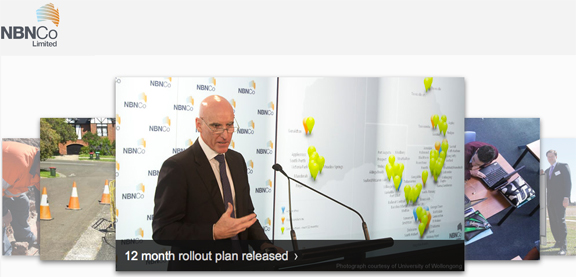[SatNews] The extension of broadband to remote areas is a costly affair...
Leigh Dayton, the Science Writer for The Australian, posted a story that reveals the NBN Co. Limited faces a bill of as much as $600 million for the launch of two high-speed broadband satellites, which are scheduled to be up and orbiting in 2015. This cost is on top of contracts worth $300m for interim broadband delivery services provided by Optus and IPSTAR and operated by Thaicom. Customers now using interim delivery services will gradually move to the new satellite system, which will serve three per cent of the population — approximately 300,000 premises — in remote areas that are beyond the reach of the optical fibre or fixed wireless networks
"There is great interest in the dynamism of the Australian (satellite launch) market," said Jean-Yves Le Gall, chairman and chief executive of Paris-based Arianespace, which launched the Thai and Optus satellites that deliver the interim service. Mr. Le Gall said in Sydney that Arianespace would launch the new Optus 10 satellite in 2013 from the Guiana Space Centre, Europe's Spaceport in French Guiana. That satellite will join the Optus satellites in orbit. Arianespace has launched NBN-style satellites for countries in Africa, Asia and Southeast Asia, as well as for France.
,br />
A spokesperson for NBN Co confirmed that "later this year" it would call for tenders from satellite launch firms, and had included the $250m-$300m cost for each launch in the $35.9 billion NBN budget. "They are deliberately not a money-making venture," the spokesman said of the satellites. Rather, the aim was to provide "metro-compatible" broadband to regional areas out of reach of the other technology. The interim system is capable of peak download speeds of up to six megabytes per second, but eventually satellites will provide 12Mbps at a uniform national wholesale price of $24 a month.
NBN Co. has released detailed tender eligibility criteria for the satellites plus the Earth stations and customer premise equipment. The company is also in discussion with the International Telecommunications Union (ITU) to secure two slots in geostationary orbit and is working with other operators to co-ordinate operating frequencies.
Regarding launch services, the spokesman confirmed NBN Co. had conducted "preliminary discussions with many companies". Arianespace regional director Richard Bowles said he had "bumped into (NBN) people at conferences". And Mr. Le Gall added that his current visit to Australia provided "a very nice opportunity to say 'hello' to the people of NBN".
NBN Co. Limited also released their 12-month national rollout plan on October 18th..., with work having already started on the rollout of the National Broadband Network in areas that are expected to cover more than half a million homes and businesses across Australia when complete. The schedule lists the communities in each state and territory where work will start between now and September 2012, as well as where work on the rollout of the network is currently underway. The plan names 28 new locations as part of the national rollout passing 485,000 premises where construction of the fibre optic network is expected to commence over the following 12 months. It also lists those sites where the rollout is already underway, accounting for a further 63,500 premises, including Second Release Sites, such as Geraldton in WA, and extensions to First Release Sites such as Townsville in Queensland. The 12-month schedule will be updated on a quarterly basis to include additional locations. Early next year, the company will also issue a three-year indicative view of the rollout, to be updated annually until anticipated completion of the rollout in ten years time.
On average it is expected to take 12 months from the start of the fibre network rollout in a given area until individuals are able to receive high-speed broadband over the NBN.
Once the network is built and ready for service, householders and business owners can purchase broadband and telephony packages from one or more of the 28 retail telecommunications providers that have signed up to offer services over the network. Twelve of these companies have already completed the necessary accreditation and on-boarding process in preparation for service delivery.


